 |
 |
03.01.26

First Look: Leadership Books for March 2026
HERE'S A LOOK at some of the best leadership books to be released in March 2026 curated just for you. Be sure to check out the other great titles being offered this month.
Innovation doesn't just happen. You need to lead it. Discover the three critical roles leaders must play in driving—and scaling—innovation. Constant tech disruption. Unrelenting economic volatility. Radically shifting demographics and work norms. More than ever, we need to innovate amid these daunting global challenges. But do we have the leadership it takes to make this innovation happen successfully? Genius at Scale breaks new ground, showing how moving from generating new ideas to actually scaling them involves cocreation—collaborating, experimenting, and learning with others both inside and beyond the boundaries of the organization. This requires three distinct types of leadership: Leader as Architect, Leader as Bridger, and Leader as Catalyst.
A powerful collection of over 50 adaptable strategy frameworks to solve today's most complex business challenges. In Leading With Strategy veteran executive coach and strategy consultant for Fortune 500 firms Timothy Tiryaki delivers a transformative guide that clarifies the complex tradeoffs in today's AI-enabled business environment. Dr. Tiryaki explores the contemporary maze of undiscussed leadership dilemmas that have been surfaced by the latest generative AI technologies and provides unique perspectives on strategic thinking and leadership. At the core of Leading With Strategy are 50 practical visual frameworks. They're dynamic tools designed as adaptable tools for creatively tackling diverse challenges and obstacles. These frameworks go beyond staid, one-size-fits-all approaches to common business problems and help you master essential strategic thinking and execution skills.
“Almost Reckless is not just a book, it's a permission slip. It's about the courage it takes to step off the algorithm's path, the clarity that comes from defining your own principles, and the joy of building something that feels unmistakably yours” saysWill Guidara, bestselling author of Unreasonable Hospitality. Amy Smilovic's cult fashion brand, Tibi, was a thriving $70 million business when she realized she was working toward someone else's idea of success. So she threw out the rulebook of how things should be done and went with her gut instead. Today Tibi is more successful than ever, and all on Smilovic's groundbreaking entrepreneurial terms. In Almost Reckless, she invites you to get comfortable with embracing smart risks in pursuit of your own vision. Sharing her story and drawing on her years of helping others identify their values and principles, Smilovic teaches you to hone your gut, and your trust in it.
From a former President of Tesla comes The Algorithm—the first book written by any of Elon Musk’s direct reports—a transformative guide for leaders, entrepreneurs, and innovators who want to emulate the paradigm-shattering approach Musk used to launch Tesla and SpaceX to meteoric success. Jon McNeill had already founded and sold six startups when Sheryl Sandberg introduced him to Elon Musk, who was looking for help at Tesla. McNeill was steeped in the lean principles that had made Toyota a global powerhouse—principles focused on achieving efficiency and optimization by incrementally improving existing systems and processes. What he learned from Elon at Tesla was its antithesis, an approach that required radical rethinking to explode the status quo, attack complexity, and set seemingly unrealistic goals. Elon called this five-step framework “The Algorithm.”
Most of us are just one event away from leaving our job. Conventional wisdom and lists of the “top reasons people quit their jobs” would have us believe that people quit when the toxic elements of their jobs grow too big or when they spot a better professional opportunity. But that’s only half the story. In reality, quitting is often triggered by a single event, inside or outside our jobs, that stops us in our tracks and causes us to rethink our relationship with work. These events are what organizational psychologist Anthony Klotz calls “jolts,” and they are the most underacknowledged realities in our work lives today. Jolts represent pivotal moments in our careers, and yet all too often, we respond to them in ways that harm our well-being and success. In Jolted, Klotz breaks down the different types of jolts we encounter and provides a road map to help us navigate them in ways that improve, rather than derail, our pursuit of the good life through our work.
Every day, powerful forces work to narrow your thinking and constrain your options. Institutional gatekeepers, social pressures, misleading narratives, and internal doubts create false either-or scenarios that trap you in cycles of mediocrity and compromise your authentic purpose. Rey Ramsey reveals how to recognize and overcome these thought tyrannies. Through compelling personal stories and proven frameworks, he shows how to harness essential virtues like humility, courage, and perseverance to expand your possibilities and make decisions aligned with your deepest values. This practical guide provides methods for critical thinking, moral compass navigation, and building resilience against manipulation tactics. Whether facing institutional resistance, conformity pressure, or limiting beliefs, you'll discover how boundary-crossing leaders break through barriers and create meaningful change.
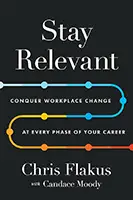 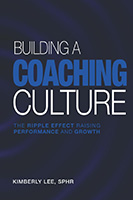 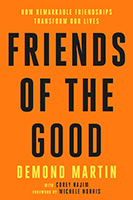 
“I read books because, at their best, they make me better, more empathetic, more socially aware, more in tune to the stranger beside me. They help me imagine a better future, provide me with answers to my insatiable questions, take me to places I’ll never get to go. ” — Annie B. Jones
Posted by Michael McKinney at 07:46 PM
02.28.26

LeadershipNow 140: February 2026 Compilation
See more on
Posted by Michael McKinney at 05:54 PM
02.27.26

4 Timeless Principles to Differentiate You From AI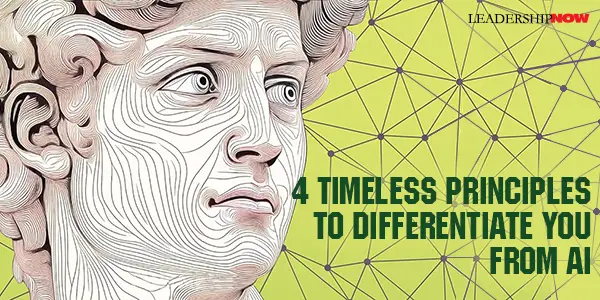
IN The Next RenAIssance: AI and the Expansion of Human Potential, AI expert Zack Kass believes “properly harnessed, AI could democratize education, revolutionize healthcare, and accelerate innovation,” but “for Al to truly serve humanity, we will be forced to solve radical new ethical dilemmas, unprecedented economic disruptions, daunting technical challenges, environmental collapse, dehumanization, the loss of identity, and above all, terrifying uncertainty.” Yet because AI is not a tangible tech – something we can see – we are naturally suspicious. How does it work? Kass writes that AI systems must begin to “show their work” rather than just spitting out an answer if they are to be trusted. How did you get to the conclusion it came to? What information was considered? How valid is it? We need real-time transparency. “Real-time transparency gives users a window into what the system is prioritizing and why, helping build informed trust instead of blind faith.” What about the future of work? “Predicting Al’s impact on jobs has become high-stakes roulette, and the bets often say more about the gambler’s worldview than technology itself. Even among industry and economic experts, the topic is very much still up for debate.” Kass offers a set of four principles meant to guide how we live, work, and lead in the age of artificial intelligence. 1. Go Outside: The physical world matters more than anything else. It is life in four dimensions. Serendipity happens naturally. The physical world carries variety that no recommender system can deliver. Algorithms collapse toward similarity. Streets, markets, trails, and small talk offer variance and surprise. Serendipity does not follow a schedule. It happens when you are a little off route, a little curious, and fully present. It shakes loose stale assumptions. It builds resilience. You learn to adapt. Adaptability will keep you relevant. Anchors will keep you principled. If you confuse methods for values, you will collapse with them. But if you adapt while anchoring in your values, you will find the formula for resilience in any era. Go outside and be in the world you are trying to serve. Be in it. 2. Learn How to Learn: Study what you want. The process alone will teach you how to learn something else. Learning trumps what you already know. You will not be defined by what you know, or even by what you have already mastered. You will be defined by your ability to master something new, and your drive to keep doing so again and again. Knowledge expires. Tools expire. But learning endures. 3. Optimize for Human Qualities: Be Human. AI will make human qualities more valuable. Courage, compassion, hope, curiosity, humor, wisdom, and empathy are measures of human achievement. And soon these “soft skills” may in fact become our primary means of differentiation. In the age of AI, your humanity is the product. Your bedside manner matters. 4. Lead with Optimism: Lead with optimism. Fear constrains. Choose a can-do approach. Progress does not happen by default. People build toward the stories they believe. Narrative sets policy. Belief sets budgets. A leader’s horizon becomes a team’s boundary conditions. If we tell stories of decline, we will write rules that constrain. If we tell credible stories of a better future, we will invest, upskill, and move. Optimism is the way forward. 
Posted by Michael McKinney at 11:16 AM
02.26.26

Leading Thoughts for February 26, 2026
IDEAS shared have the power to expand perspectives, change thinking, and move lives. Here are two ideas for the curious mind to engage with: Deborah Gruenfeld on showing respect: “We often fail to realize that the ability to show respect and even submission can also be a source of power. Deference is treating another person in ways that acknowledge that their expertise and experiences are at least as important as your own. It does not mean you have less power than the person you are deferring to. It means you do not intend to use the power you have against your relationship partner. Deference is disarming, it signals an absence of threat, and it creates a foundation of trust that allows a relationship to form.” Source: Acting with Power: Why We Are More Powerful Than We Believe Tony Dungy on putting others first: “Instead of asking, how can I lead my company, my team, or my family to a higher level of success? we should be asking ourselves, how do others around me flourish as a result of my leadership? Do they flourish at all? How does my leadership, my involvement in their lives—in whatever setting we’re in—have a positive and lasting influence on them?” Source: The Mentor Leader: Secrets to Building People and Teams That Win Consistently Look for these ideas every Thursday on the Leading Blog. Find more ideas on the LeadingThoughts index.
Posted by Michael McKinney at 01:39 PM
02.23.26

The Leaders We Want to Follow Lead with Radical Humanity
WHEN Johann Wolfgang von Kempelen unveiled his chess-playing automaton in the courts of 18th-century Europe, audiences were spellbound. The “Mechanical Turk” was the first machine that appeared to think like a human. It beat anyone it played against, regardless of their playing abilities or social status. For decades, it toured the world as proof that human intelligence had finally been replicated by a machine. It took bribery to finally get von Kempelen to reveal the secret of his unbeatable machine. Hidden inside the cabinet, crouched among gears and pulleys, sat a human chess master. The intelligence had never been artificial. It had just been concealed. This may be an old and well-known story, but its lessons haven’t stuck. Today, we’re once again mesmerized by machines that appear to think, speak, decide, and even lead. From algorithmic hiring tools to AI-generated strategies — even to AI “CEOs” — leadership is being reframed as optimization, speed, and polish. While many see the danger of AI as machines becoming more human, the real danger is that human leaders are becoming more mechanical. In the age of AI, the leaders who matter most will be the ones who lead most like humans, precisely when too many leaders are acting as if they, too, are automated. Just like the automaton, perfection looks impressive from a distance until you can see, up close, that it’s hollow. The more polished leaders become, the more people worry about what they have to hide. This is why the future of leadership belongs to those who are prepared to be radically human. It belongs to those who hesitate, question, doubt, regret, and care. It’s these attributes that constitute the raw material of trust. For decades, we’ve tried to be predictable, efficient, emotionless, and certain. We’ve confused clarity with certainty and polish with credibility. Leaders are compelled to hide the very elements that make people want to follow them. Radical humanity asks for the opposite. It asks leaders to stay present rather than performative, curious rather than certain, courageous rather than compliant. It asks them to resist the illusion that confidence is the absence of doubt, or that authority comes from having all the answers. The Mechanical Turk fooled Europe because people believed intelligence could be detached from messy humanity. We want to believe the same thing today. But leadership isn’t perfection. Leadership is judgment, presence, and moral courage in an imperfect world populated by imperfect people living imperfect lives. That’s why the future of leadership will never belong to those who sound most like machines. The future belongs to those who are willing to sound unmistakably human. Here are five actions leaders must take if they want to remain credible and trusted in an AI-saturated world. 1. Show your workings, not just your answers. I learned at school that to get marks you had to show your workings. A confident answer without any context only breeds suspicion. As a leader, show how you think, where you hesitate, and the dilemmas you’re grappling with. Vulnerability increases credibility just as fake certainty destroys it. 2. Say “I don’t know” sooner than you feel comfortable. “But if I say I don’t know, won’t they wonder why I’m paid more than them?” was the reply to me when sharing this tip with a client. But showing uncertainty demonstrates value. By signalling honesty and inviting contribution, you create safety in a way that hiding doubt or giving a polished answer never could. 3. Stand still when pressure demands speed. AI optimizes for immediacy. But while everyone can think fast and AI faster, no one can reflect quickly. Leadership has always required discernment. Pausing to sense emotions, tensions, and ethical trade-offs is a human advantage, not a weakness. Married with tip 2, it’s a superpower. 4. Stand up for what’s right, not just what’s expedient. You will be remembered for what you tolerated way more than for what you did. Standing up for what’s right is what people will remember long after the results themselves have been forgotten. 5. Design culture through presence. Belonging is created in how leaders show up, listen, and respond under pressure. Culture isn’t designed, declared, or demanded. It’s experienced. Be in the moment wherever you are. The Mechanical Turk eventually lost its mystique. Born in the courts of Europe, it was finally laid to rest in its fairgrounds. The illusion collapsed as the truth became known. There’s no doubt that AI will continue to improve. Systems always become faster, smoother, and more convincing. But leadership was never meant to be mechanized. The uncertainties, emotions, and imperfections we are tempted to remove in the face of machine-like precision are precisely the qualities that allow trust, responsibility, and belonging to exist at all and the truth to emerge. The future of leadership isn’t artificial. It has to be alive.
 
Posted by Michael McKinney at 01:12 PM
02.19.26

Leading Thoughts for February 19, 2026
IDEAS shared have the power to expand perspectives, change thinking, and move lives. Here are two ideas for the curious mind to engage with: Nicole Vignola on self-talk: “If you tell yourself you’re having a bad day, your brain will find ways to reinforce that belief, and you’ll go about the rest of your day finding ways to prove that this day is bad. And so it is with negative self-beliefs. When you believe that you are not worthy, or not confident, or you have a negative belief about yourself, your body language follows that belief. Moreover, the brain perceives your behaviour as normal and stops paying conscious attention to it, and before you know it, you’ve snowballed to further reinforce this belief with everything you do.” Source: Rewire: Break the Cycle, Alter Your Thoughts and Create Lasting Change Leslie John on the power of opening up: “Something sensitive, we are not necessarily entering a zero-sum transaction. We are creating a possibility for mutual trust, better relationships, connection, growth, even safety. Ironically, what seems like a loss of control is often what unlocks the very things we want most. This is the mistake economists (and, frankly, a lot of us) often make: treating information as a commodity to be protected or extracted. Disclosure is an investment—it’s risk in the service of trust.” Source: Revealing: The Underrated Power of Oversharing Look for these ideas every Thursday on the Leading Blog. Find more ideas on the LeadingThoughts index.
Posted by Michael McKinney at 12:43 PM
02.12.26

Leading Thoughts for February 12, 2026
IDEAS shared have the power to expand perspectives, change thinking, and move lives. Here are two ideas for the curious mind to engage with: Mark Crowley on being passionately curious: “Something insidious often happens when people become adults. We become almost anti-curious. One big reason for this is that our human egos prefer to feel knowledgeable and successful at all times. Not wanting to feel vulnerable to anything unknown or in flux, our minds silence otherwise solid reasons to seek new methods, approaches, or skills. ‘You’re already doing great,’ our egos assure us. ‘There’s no need to invest time and energy in anything new.’” Source: The Power of Employee Well-Being: Move Beyond Engagement to Build Flourishing Teams Todd Henry on knowing yourself: “The stories we believe about how the world works often play a critical role in helping us interpret the meaning of events. It’s important that we gain an understanding of not only what those deeply held beliefs are, but also how they might be affecting our daily activity. Doing so, and then mapping our activity around that self-knowledge, is one of the keys to sustained success.” Source: Die Empty: Unleash Your Best Work Every Day Look for these ideas every Thursday on the Leading Blog. Find more ideas on the LeadingThoughts index.
Posted by Michael McKinney at 11:40 AM
02.09.26

Learn Faster by Failing Smaller: How Making Mistakes Can Become a Brilliant Source of Growth
WE’RE often told about the benefit of learning from our failures, but the reality is that it’s easier to say than do. Failure feels uncomfortable and exposing. Rather than sit in vulnerability, it’s much easier to move forward and replace reflection and regret with action and distraction. But leaving the learning behind means we miss an opportunity to grow. Our career resilience relies on being able to navigate hard moments with confidence and control and become better because of them. Whether it’s a presentation that’s gone wrong, a relationship that has broken down, or an important deadline that you’ve missed, our first response should be to pause, reflect, and learn from the situation. Waiting for a BIG failure makes it hard to develop this skill. Big failures don’t happen often and come with lots of emotion. Trying to change your behavior when you’re in the middle of a big failure can feel doubly difficult. It’s much better to look for smaller failures to learn from, also known as mistakes. Mistakes are a much easier place to start. We all make lots of mistakes, so we have many more moments to learn from, and they are less emotionally charged so reflection feels less daunting to do. A mistake might look like sending the wrong information in an email, arriving late for a meeting or not having the right data you need for a discussion. Mistakes won’t be disastrous for your development, but missing out on the learning might be. Repeating the same mistake can affect your reputation and lead to small issues, causing more significant problems over time. Turning mistakes into learning is a healthy habit for everyone’s development. There are two ways you can start to learn from mistakes: 1. Mistake meetings – these work well as a team learning activity. A regular meeting goes in the diary (monthly seems to be the right cadence for most of the teams that we work with), and everyone brings a mistake they have made. The mistake is shared, the team offers support, and a plan to prevent the mistake from being made again is co-created. The benefit of this approach is that the discussion creates trust in the team and means that everyone is more likely to buy into doing things differently in the future. 2.Mistake moments – this approach works individually or as a team and has created more immediacy than waiting for a meeting to go in the diary. With Mistake Moments, the reflection happens within 24 hours of the mistake happening. The mistake is either written down or shared with a group on the day via an online communications channel like Teams or Slack. A similar structure is used for each mistake: What was the mistake, why did it happen, and how can you learn from it. The benefit of this approach is that the weight of a mistake doesn’t sit with anyone for long, support is offered rapidly, and learning from mistakes can quickly become a routine. The more regularly you reflect on your mistakes, the less exposing failure feels. Instead of moving on and leaving the learning behind, we become more comfortable with the inevitable change and challenge we all experience at work, and much more skilled at growing through what we go through.  
Posted by Michael McKinney at 05:07 PM
|
BUILD YOUR KNOWLEDGE
 

How to Do Your Start-Up Right STRAIGHT TALK FOR START-UPS 
Grow Your Leadership Skills NEW AND UPCOMING LEADERSHIP BOOKS 
Leadership Minute BITE-SIZE CONCEPTS YOU CAN CHEW ON 
Classic Leadership Books BOOKS TO READ BEFORE YOU LEAD |